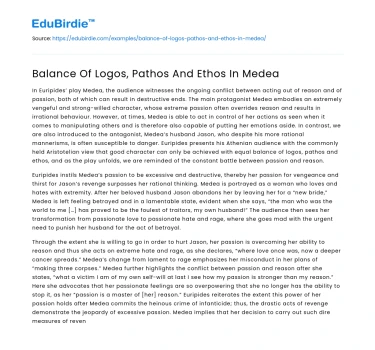In Euripides’ play Medea, the audience witnesses the ongoing conflict between acting out of reason and of passion, both of which can result in destructive ends. The main protagonist Medea embodies an extremely vengeful and strong-willed character, whose extreme passion often overrides reason and results in irrational behaviour. However, at times, Medea is able to act in control of her actions as seen when it comes to manipulating others and is therefore also capable of putting her emotions aside. In contrast, we are also introduced to the antagonist, Medea’s husband Jason, who despite his more rational mannerisms, is often susceptible to danger. Euripides presents his Athenian audience with the commonly held Aristotelian view that good character can only be achieved with equal balance of logos, pathos and ethos, and as the play unfolds, we are reminded of the constant battle between passion and reason.
Euripides instils Medea’s passion to be excessive and destructive, thereby her passion for vengeance and thirst for Jason’s revenge surpasses her rational thinking. Medea is portrayed as a woman who loves and hates with extremity. After her beloved husband Jason abandons her by leaving her for a “new bride,” Medea is left feeling betrayed and in a lamentable state, evident when she says, “the man who was the world to me […] has proved to be the foulest of traitors, my own husband!” The audience then sees her transformation from passionate love to passionate hate and rage, where she goes mad with the urgent need to punish her husband for the act of betrayal.
Save your time!
We can take care of your essay
- Proper editing and formatting
- Free revision, title page, and bibliography
- Flexible prices and money-back guarantee
Through the extent she is willing to go in order to hurt Jason, her passion is overcoming her ability to reason and thus she acts on extreme hate and rage, as she declares, “where love once was, now a deeper cancer spreads.” Medea’s change from lament to rage emphasizes her misconduct in her plans of “making three corpses.” Medea further highlights the conflict between passion and reason after she states, “what a victim I am of my own self-will at last I see how my passion is stronger than my reason.” Here she advocates that her passionate feelings are so overpowering that she no longer has the ability to stop it, as her “passion is a master of [her] reason.” Euripides reiterates the extent this power of her passion holds after Medea commits the heinous crime of infanticide; thus, the drastic acts of revenge demonstrate the jeopardy of excessive passion. Medea implies that her decision to carry out such dire measures of revenge was made based on her passion rather than reason.
Did you like this example?
Make sure you submit a unique essay
Our writers will provide you with an essay sample written from scratch: any topic, any deadline, any instructions.
Cite this paper
-
APA
-
MLA
-
Harvard
-
Vancouver
Balance Of Logos, Pathos And Ethos In Medea.
(2022, Jun 09). Edubirdie. Retrieved March 3, 2025, from https://hub.edubirdie.com/examples/balance-of-logos-pathos-and-ethos-in-medea/
“Balance Of Logos, Pathos And Ethos In Medea.” Edubirdie, 09 Jun. 2022, hub.edubirdie.com/examples/balance-of-logos-pathos-and-ethos-in-medea/
Balance Of Logos, Pathos And Ethos In Medea. [online].
Available at: <https://hub.edubirdie.com/examples/balance-of-logos-pathos-and-ethos-in-medea/> [Accessed 3 Mar. 2025].
Balance Of Logos, Pathos And Ethos In Medea [Internet]. Edubirdie.
2022 Jun 09 [cited 2025 Mar 3].
Available from: https://hub.edubirdie.com/examples/balance-of-logos-pathos-and-ethos-in-medea/
copy






 Stuck on your essay?
Stuck on your essay?

